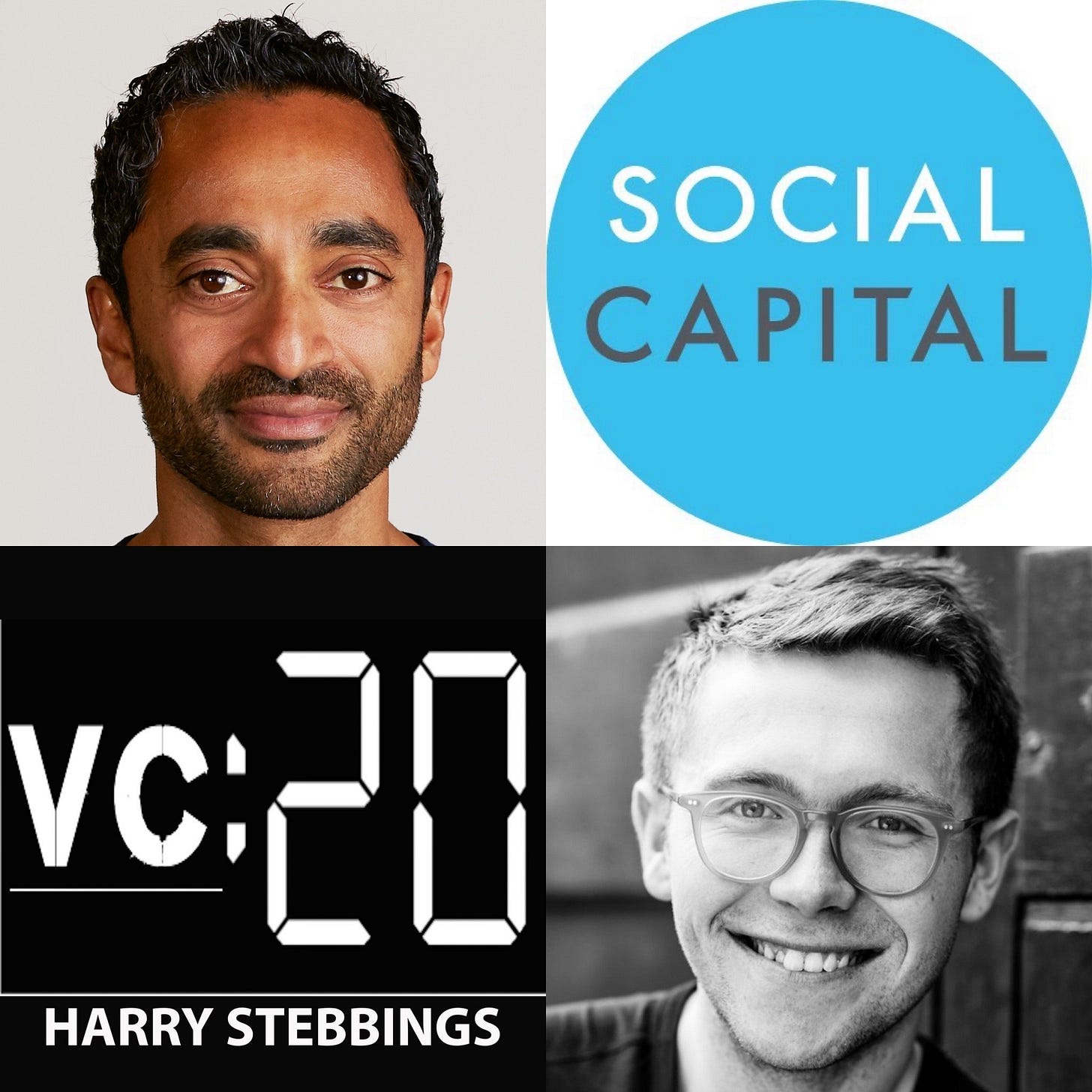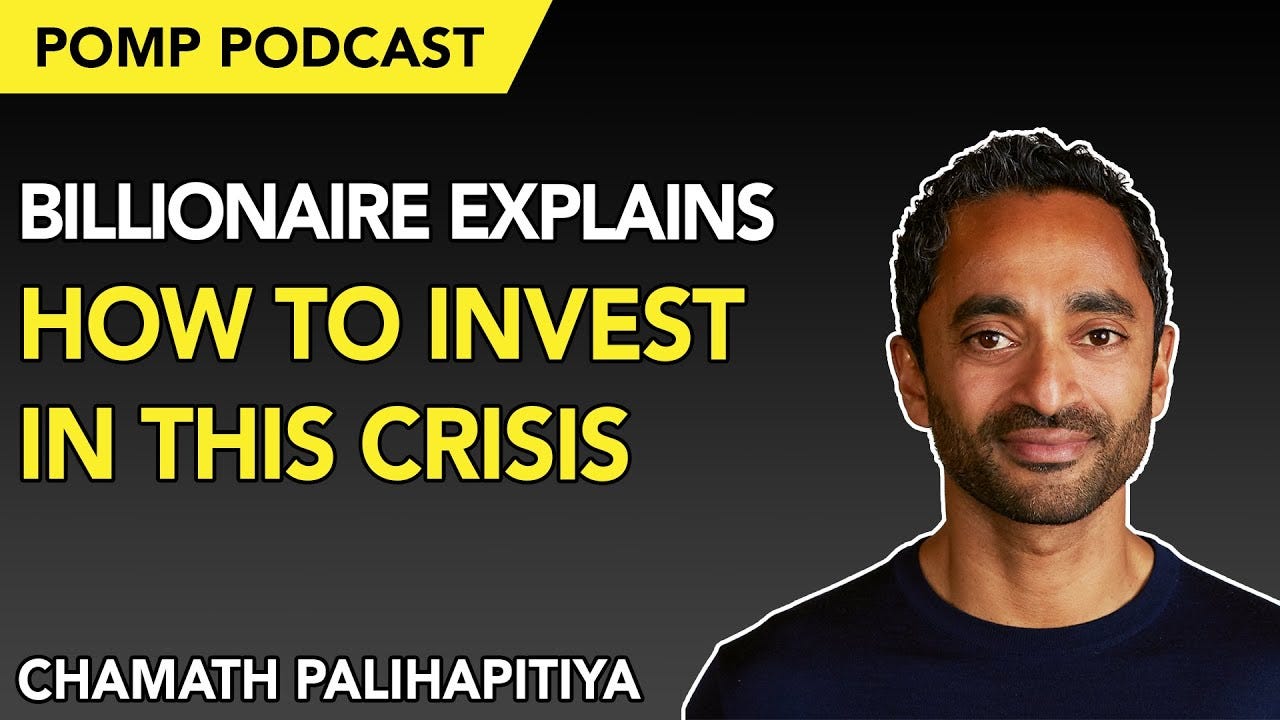The Chamath Special - Investing Billions, The Future of Venture, Broken IPOs and Everything in Between
Chamath Palihapitiya is the CEO of Social Capital, the Chairman of Virgin Galactic, and the owner of the Golden State Warriors
20VC: Chamath Palihapitiya on Why IPOs and Direct Listings Are Broken, Turning Social Capital Into A Combination of Berkshire Hathaway, Koch Industries and The Red Cross, Why Forecasts Are Worthless, What Creates True Defensibility & Why You Have To Be Predisposed To Inaction When Investing Billions
(July 13, 2020 - 52 minutes)
Chamath Palihapitiya is Founder & CEO @ Social Capital, the organisation on a mission to transform society by using technology to solve the world’s hardest problems.
The Twenty Minutes VC - Venture Capital, Startup Funding, The Pitch
By Harry Stebbings - Founding Partner @ Stride.vc & Founder of 20VC Microfund
LESSONS FROM AOL AND FACEBOOK
1. Never underestimate the power and value of a network effect. Even with poor product quality, product strategy, and execution, users can still keep the product afloat with their voluntary input towards third-party technology, acoustics, and others.
2. Forecasts are worthless for early-stage founders because the business is still immature and unpredictable. Instead, have a detailed product plan that shows what the founder intends to do, choose a simple method to measure the impacts, and work forward from there. If your investor insists on seeing a forecast when everything is still transient, get a better investor.
3. There are no silver bullets in life. Compound interest – disciplined execution over long periods of time – is what makes things work. Also, thoughtful tactics go a long way.
4. Always try to have a better understanding of business moats and amplify these moats with product features to have an advantage over your competitors.
SOCIAL MEDIA VS. MORALS
Social networks like Facebook and Twitter make different decisions when balancing between the morality of the employees, the board, the shareholders, and the stakeholders. These decisions cause a distribution of outcomes that reflect their moral and ethical view into their products. Due to the lack of a one-size-fits-all social networking product for information consumption, fragmentation happens to create more flexibility.
ASSESSING THE LEVEL OF INTEGRITY
Integrity compounds infinitely, but capability always decays. That’s why it’s important to hire someone who is more mission-aligned or morally-aligned with the business.
Determine if you’re hiring for functional role and competence or a set of behavioral markers because you don’t need integrity for functional roles with binary outcomes like engineers. However if you’re hiring for partners, integrity must be part of their character. The only way to find people with high integrity is to spend time with them and watch how they treat other people, approach problems, and let their guard down.
The velocity of rounds doesn’t challenge the determination of their integrity between founders and investors, but more so between investors and their partners. There are no points of demarcation and you only learn about your partners in sporadic bursts over a very long period of time.
WHEN INACTION ISN’T INACTION
As venture capitalists, the predisposition should be towards action – get in the game, make sure there are enough chips in the playing field, and get lucky. However, the bigger the check you’re writing, the longer you should wait, i.e. practice inaction.
Inaction doesn’t mean doing nothing. It means understanding the broad landscape, refining very specific ideas, and becoming expert enough to make qualified decisions on the large quantum of capital.
Investing is an infinite game where the competitor is your own psychology. When you’re trying to win an infinite game, the only marker of success is survival. But many people treat investing as a finite game where they try to sum up their net worth, assets, etc. Financial markets are just a test to psychologically evolve, survive, and build true emotional resilience.
SPACs
More liquid efficient market for founders is found in the public markets, not private markets. SPAC was created to make it as simple, efficient, and transparent as possible. Traditional IPOs are broken because they take 18 months to pull off and you can’t raise primary or secondary capital – whereas through SPAC, you can pre-bake the IPOs, get FCC approvals, and shorten the process to 90 days only. SPAC also allows you to go public through a merger, create forecasts, and allow employees and founders to get liquidity from day one.
BOARD MEMBERS AND CEOs
To be a great board member, governance matters, especially as a company scales. Stand up for yourself – no board is worth violating your own moral compass. Prepare for meetings by studying pros memos to understand your point in your own psychological journey in running a company.
THE FUTURE OF VENTURE
Entrepreneurship is starting to decentralize as it swings towards global innovation. As it happens, returns will decay, just like in every expanding market.
Removing the management fee and getting people to be more carry-oriented gets more people invested in the process. If the fees get crushed to virtually nothing, and make people transparently disclose their profits, entrepreneurs would demand to be paid no more, no less than the CEOs, which is fairly reasonable.
#258: Billionaire Chamath Palihapitiya on How To Invest Through This Crisis
(April 2, 2019 - 84 minutes)
Chamath Palihapitiya is the Chairman of Virgin Galactic, and the owner of the Golden State Warriors
Anthony Pompliano | The Pomp Podcast by Anthony "Pomp" Pompliano - Co-founder & Partner at Morgan Creek Digital, invested $100M+ in early stage companies, including multiple unicorns.
HAVING A BILLION DOLLAR NETWORK
While having a billion dollars may seem cool at first, Chamath mentioned that it also amplified his insecurities. He realized that it doesn't actually solve any of your problems and that your swings are going to be much larger–You could lose your money as fast as it came in.
BEING AN INVESTOR
With that said, he applied a more patient approach to his investments. To him being an investor isn't a 'job', it's being a good observer in the moment of time. An important aspect to him practicing and refining his toolkit is his psychology. He believed that becoming a better person has contributed to him making better decisions overall.
TRACE ROUTING
When it comes to choosing your investments, Chamath mentions that the setup is important. By positioning himself defensively, he allows himself to trace route any business prior to making decisions. From trace routing, you're not actively buying but instead, learning. With all the breadcrumbs you realize that all businesses are actually interconnected.
SELLING TO SMBs
Over the years, we've shifted to SMB/SMEs due to its faster money cycle. But many fail to realize just how brittle this customer base is; they will be the first to stop paying. As most startups are also mono-products, it also puts them at a disadvantage because it might not solve all of the CEO/CFO's problems.
SELLING TO THE GLOBAL 1000
Chamath took companies who sold to the Global 1000 as an example. He mentions that while these companies consume a large amount of capital to build their go-to market, the capital can also act as a protective moat when a crisis hits. Their customer base also have a higher chance of staying in business compared to SMBs.
THE IMPORTANCE OF THE FULCRUM SECURITY
With the happening of this global pandemic, Chamath notices that in this search of efficiency, we've empowered certain countries and economies to have leverage as they make up our fulcrum security. In order for us (USA) to counter this deflationary pressure, he believes that we have to pivot to a more resilient economic model.
COMBATING THE DEFLATIONARY CYCLE
Chamath thinks that instead of issuing debt to drive higher GDP, putting enough money in the system and creating incentives to drive prices up can help grow our way out. By encouraging more things to be domestically created and produced, you'll be able to get closer to full employment and create more competitiveness in the market–and that's how you move away from debasement.
EVALUATING EQUITIES
While the debt markets are definitely very intertwined and interconnected, Chamath doesn't think that the federal reserves will pick equities as cherry picking wouldn't work in this crisis–it's an all or none issue. He reiterates that choosing the path of inefficiency is what will help as it creates costs to be passed downstream.
BITCOIN’S POTENTIAL
He feels that Bitcoin needed a moment like this for it to be relevant as it can act as security or a fall back. However, he still believes that it is too speculative for it to be reliable; Bitcoin can be a quasi gold-standard only if the US dollar hits debasement but that path dependence will only emerge in a 10 year trajectory.
MAKING GOOD DECISIONS
Prior to placing capital, he stresses how equanimity is important. In order to achieve this, he maintains clarity and gratitude at home. This energy then passes through to his professional life where he is able to manage his psychology and make really good decisions. Staying humble, waiting for your moment and then participating in a functional way is what he sees as the real skill.
EVALUATING YOUR INVESTMENTS
To Chamath, it all begins with noticing what elements are not going to change. By clarifying a hierarchy of needs, you'll be able to see which companies have been disproportionately punished. Once you overlay those dynamics onto the emerging markets, you'll be able to see a bunch of bankruptcies and from there decide whether to step in.
GOING PUBLIC WITH SPAC
Chamath thinks that there are plenty of good tech businesses that can benefit from going public and that SPAC is the only way for them to do so. Due to it being a merger, the process is also dramatically simplified and fast; the capital is also flexible whereas compared to a traditional IPO, it's a lot more difficult.
THE EFFECTS OF BAD BEHAVIOR IN THE MARKET
Taking from the crisis in 2008, all the government did was allow financial institutions to buck and leverage off the balance sheet; but a closer look will show you that by having superficially propped up stock price, only a handful of people benefitted and this should be restrained in the future in order to help the economy.
BENEFITTING FROM CAPITALISM DESPITE THE PANDEMIC
Chamath notes that this depends on what you view capitalism as–to him it's money becoming a fulcrum for change. Since money is your lubricant, the person who's willing to put more, or be more clever will have a higher opportunity to win. So to him, companies that aren't taking smart bets to advance humanity once given the chance, will eventually be punished financially.
Thanks for reading. Reach us @Twitter / @Facebook with tips and feedback or by leaving a comment to our post here. Remember to share if you like what you read.
If you are hungry for more of Podtakes, do check out our Archive here for more.




